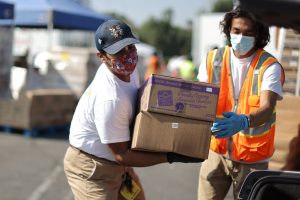
Right this minute, some 10,000 people are busy trying to save the world from another natural disaster. At the same time, Amnesty International reports that in the 28 years between 1989 and 2017, nearly 2.5 million people have died in armed conflicts. When we focus on personal suffering, such as a child being pulled out of the ruins of a building destroyed by a bomb or an earthquake, our hearts cringe with compassion. In fact, it doesn’t have to be a human being that’s suffering. There are plenty of heart-wrenching videos on social media showing animals trying desperately to cross a road or help defend one another against predators, and we deeply sympathize with them. But when millions die by war, starvation, or disease, when tens of millions are abused by slavery, tyranny, and countless other forms of exploitation, we are mostly numb and apathetic. We may perceive ourselves as caring individuals because we feel for the weak individuals, but our indifference to the suffering of nations and masses exposes our selfish motivations. It’s important that we acknowledge this because once we recognize it we can begin to change ourselves into genuinely caring individuals.
If we can put ourselves in someone else’s shoes, we can feel empathy. But this is not kindness; it is imagining how I would feel if I were in that situation. It is not only selfish, it also tricks us into thinking we are kind and makes us feel good about ourselves. Nothing slows our changing into truly caring individuals more than thinking we are already kind.
If we want a truer picture of ourselves, we should examine how we feel about any suffering, how accountable we feel, and whether or not it galvanizes us into positive action toward connection, toward unity.
The feeling of commonality does exist within us, but it’s buried very deep. Nature is pushing us to reactivate it but if we don’t initiate, it will have to push us all the way and that will be a very painful process. We can see what nature is already doing to our planet, to plants, animals, and people. Already, there is extinction of entire species, burning of forests over huge swaths of land, flash floods that destroy millions of acres, starving people everywhere, from the Third to the First World, and a global pandemic that’s wreaking havoc in our social order. All these are nature’s “attempt” to stir us into action, to develop mutual responsibility and caring rather than the current narcissistic individualism.
If we allow nature to work alone and don’t initiate correction of our nature by our own volition, it will do it, but the trail that leads there will be a long and bloody one, soaked with sweat and tears.
There is no need to suffer like that. We can start working on our mutuality right this minute. Even if we don’t succeed, our efforts will do the trick and we will change. It is much better to try and fail and try again until it works and we learn how to care for one another, than not to try and have nature change us by force.
Posted on Facebook